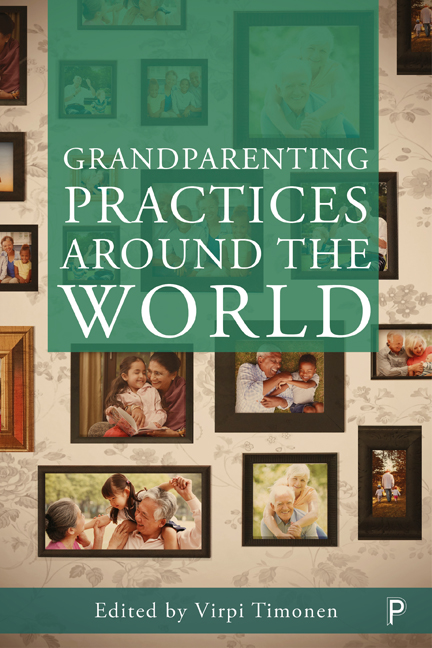Book contents
- Frontmatter
- Contents
- List of figures and tables
- List of abbreviations
- Notes on contributors
- one Introduction: widening the lens on grandparenting
- PART 1 The demographic and welfare-state contexts of grandparenting
- PART 2 Grandparenting in contexts of economic and societal development
- PART 3 Transnational grandparenting
- PART 4 Gender, intersectionalities and grandparenting
- PART 5 Grandparental roles, agency and influence
- Index
five - Second-parenthood realities, third-age ideals: (grand)parenthood in the context of poverty and HIV/AIDS
Published online by Cambridge University Press: 22 April 2022
- Frontmatter
- Contents
- List of figures and tables
- List of abbreviations
- Notes on contributors
- one Introduction: widening the lens on grandparenting
- PART 1 The demographic and welfare-state contexts of grandparenting
- PART 2 Grandparenting in contexts of economic and societal development
- PART 3 Transnational grandparenting
- PART 4 Gender, intersectionalities and grandparenting
- PART 5 Grandparental roles, agency and influence
- Index
Summary
Introduction
Within contexts of poverty and the AIDS-related epidemics in (South) Africa, this chapter positions itself at the interface of the historical–moral engagement of grandparents in the care and nurturing of grandchildren with contemporary social realities and aspirations. Grandparents, specifically grandmothers, in (South) Africa have always found themselves in a situation of reciprocal exchanges: grandmothers raised and/or nurtured children, young children assisted with house and agricultural work, and absent adult children (the migratory parents of the children being raised by these grandmothers) provided income. The phenomenon of the oldest generation in (South) Africa caring for younger generations thus builds on a long-established continuum of social structures and norms related to intergenerational support, including childcare. What distinguishes the current role of grandparents in the HIV/AIDS context is that, rather than forming part of a web of complementary socialising agents within communities, they are increasingly being forced – as their children become incapacitated and even die – to take sole responsibility for their grandchildren, including legal guardianship. The responsibility for focused childcare in the HIV/AIDS context is further – at least for part of the time – compounded by dedicated care of sick and dying children and/or grandchildren, chronic poverty and the unemployment of younger generations.
Background
The uncertain situation of grandparents (specifically grandmothers) in relation to their own care futures should be understood against the backdrop of poverty exacerbated by the HIV/AIDS pandemic.
Poverty
Most singularly, entrenched poverty characterises Sub-Saharan Africa (SSA), with its otherwise huge diversity of populations. Of the 41 countries with the lowest human development ranking listed in the 2016 Human Development Report of the UN Human Development Index (UNDP, 2016), 35 are situated in SSA. Although South Africa ranks 119th out of 188 positions and is categorised as a medium development country, it has one of the highest levels of economic inequality in the world, with a Gini coefficient of 0.68 in 2015 (Stats SA, 2017). A legacy of previous policies related to colonialism and apartheid, the group most affected by this entrenched inequality is Black Africans (categorised as such by Statistics South Africa). South Africa's unemployment rate hit a 12-year high in 2016 at 27.3% in the third quarter, while the youth unemployment rate is close to 50% (Stats SA, 2017).
- Type
- Chapter
- Information
- Grandparenting Practices around the World , pp. 89 - 110Publisher: Bristol University PressPrint publication year: 2018

